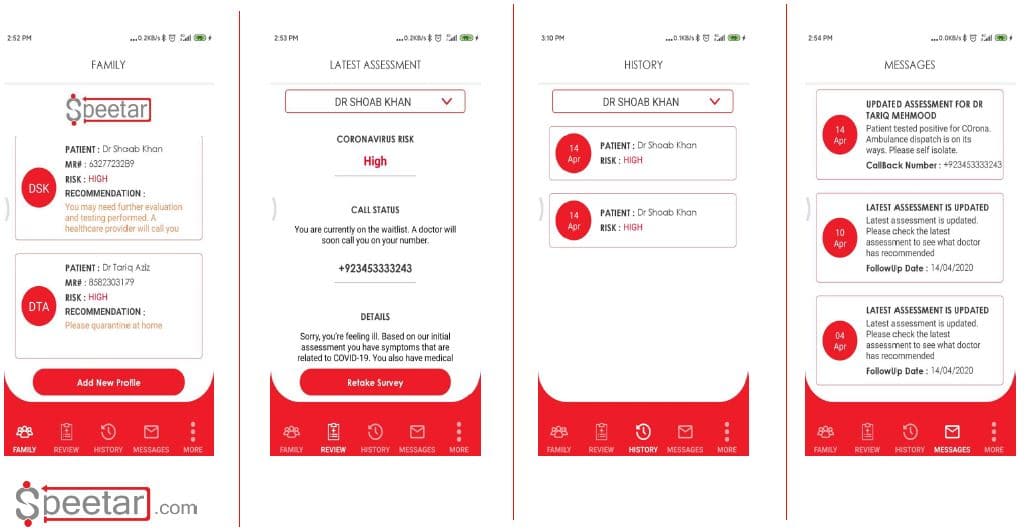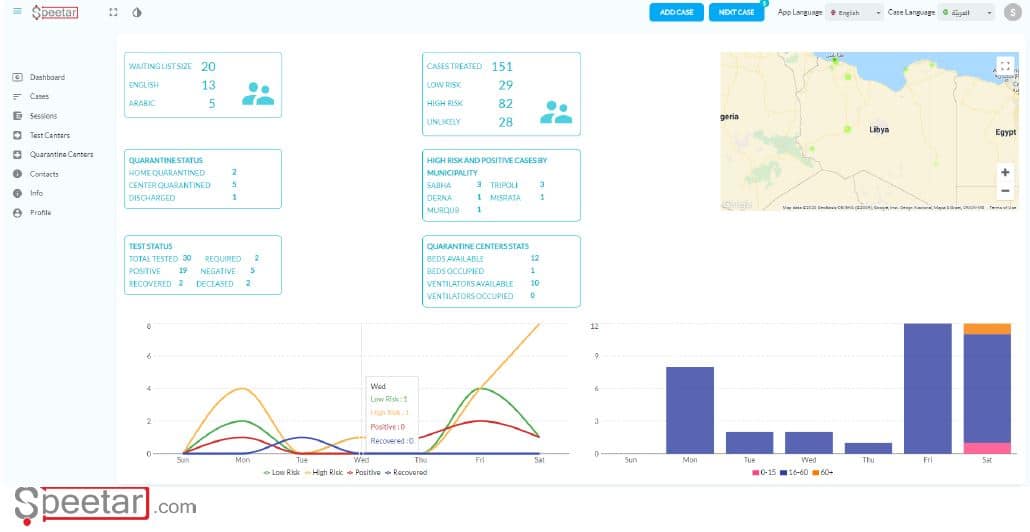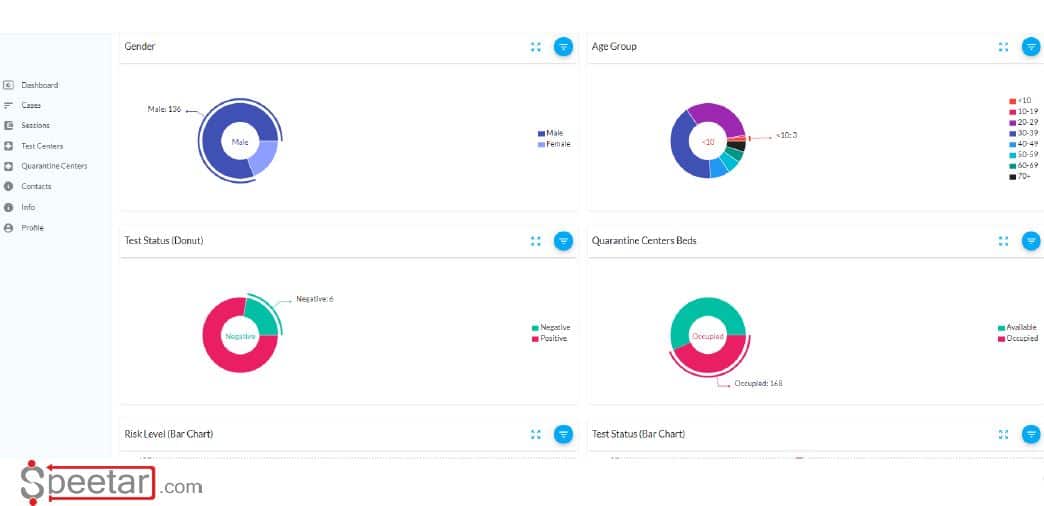Speetar, a digital healthcare startup incorporated in Pakistan, is hoping to build on the success that its state-of-the-art telemedicine and… Read More
The post Pakistani Telehealth Startup that Helped Libya Fight Coronavirus Now Hopes to Replicate the Model in Pakistan appeared first on .
Speetar, a digital healthcare startup incorporated in Pakistan, is hoping to build on the success that its state-of-the-art telemedicine and Covid-19 solutions have achieved in Libya to fight epidemics in Pakistan.
A robust platform that links patients in select diaspora with physicians who understand their language and context, Speetar today is being used as a key technological solution supporting Libya’s fight against Covid-19.
At the same time, the founders believe that Speetar’s platform can be utilized not only to ramp up Pakistan’s fight against the coronavirus pandemic, but also to battle other infectious diseases in the country, such as dengue and polio.
Speetar’s aim is to use telehealth to improve healthcare facilities, especially in war-torn countries like Libya, Syria, Yemen, Afghanistan, and parts of Pakistan where healthcare facilities have suffered greatly as a result of political or social unrest.
Co-founded by Shoaib Akmal, Zohaib Akmal, and Asim Ajmal from Pakistan and Dr. Muhammed Aburawi from Libya, Speetar is based in Pakistan with operations in Pakistan and Libya. The startup has its technology arm based in Islamabad that has developed the Covid-19 app and a cloud platform from Pakistan.
A social enterprise, Speetar was incubated at Harvard Medical School’s SICI (Social Innovation and Change Initiative) and MIT Sandbox Innovation Fund. At MIT, Speetar also received a $USD 20,000 grant.

Speetar’s role in Libya
The Covid-19 app, developed by Speetar Pakistan, is allowing Libyans to get advice from physicians based on their symptoms, minimizing the risk of exposure in the country that is crushed between a civil war and a pandemic.
“Patients can log on from home and can register if they have symptoms,” said Dr. Aburawi. “This means clinics can better manage triage, that is, determining who needs to get the care and the order in which patients are treated.”
Aburawi added that if patients go to the clinic to be triaged, they are going to either possibly infect others if they already have the virus, or they are possibly going to get infected. Through Speetar’s app, Aburawi says, they can save that risky visit.
Apart from its Covid-19 app, Speetar’s flagship telemedicine solution – available both as a mobile app and web interface – allows patients to book online appointments with doctors and schedule medical consultation sessions.
The doctor and patient can then have a video conference allowing the doctor to ask questions and recommend treatment to the patient. The doctor can also write a prescription for the patient which they can see online.
On the platform, the patient can also upload their previous medical history and any previous test results and labs to their online profile, which is visible to the doctor assisting them with the diagnosis.
Speetar’s vision for Pakistan
While it’s playing a crucial role in Libya’s fight against the novel coronavirus, Speetar may just be one of the many telehealth apps currently available to address the Covid-19 crisis in Pakistan where the tech scene is much better than in Libya.
This is the fact that is also acknowledged by Speetar Pakistan’s CEO and cofounder Shoaib Akmal. “With so many telemedicine and triage apps from the government and private developers currently operating in Pakistan, Speetar’s focus is not just on Covid-19, but beyond that,” said Shoaib.
While Speetar is in the talks with the Pakistani federal and provincial governments and private entities to roll out the solution locally and support the country’s fight against the pandemic, Shoaib says that he envisions the platform to be of help beyond Covid-19.
Some of the coordination gaps that currently exist in Pakistan’s approach to tackling the virus – a situation where provinces appear to be working in silos and systems seem to lack a direction – can be filled by Speetar, says Shoaib.
Speetar, Shoaib says, has the potential to unify all relevant information and data in one place where it can be accessed and utilized to draw better strategies to control infectious diseases like dengue, malaria, and polio.
It’s a powerful model where vital information passes on to the triage center doctors who reach out to patients remotely to assess the severity and recommend the next steps accordingly.
The platform also provides dashboard and reports which allows for data-driven decision making, contact-tracing to help stop the spread, and disease hotspot/cluster identification allowing for authorities to respond to disease outbreaks proactively.


“The data can help authorities identify high-risk areas which can be vital knowledge for basing critical decisions on,” says Shoaib. “Moreover, the model will also help early detection of a disease and its spread, enabling authorities to mobilize resources in time to tackle the outbreak.”
Besides triaging patients, the Speetar platform can be optimized for the administration of vaccines. “The world is anxiously awaiting the arrival of a coronavirus vaccine, but even when it’s ready, administering it to huge populations will emerge as the next big challenge,” Shoaib says.
That’s also one of the situations where a solution like Speetar will be of critical help, he says. “We want to engage with the government of Pakistan, like we are doing in Libya, and support the national efforts to fight and eradicate difficult diseases from the country,” Shoaib adds.
The post Pakistani Telehealth Startup that Helped Libya Fight Coronavirus Now Hopes to Replicate the Model in Pakistan appeared first on .
29/05/2020 03:13 PM
29/05/2020 01:35 PM
29/05/2020 06:13 AM
29/05/2020 06:23 AM
29/05/2020 01:50 PM
29/05/2020 01:46 PM
29/05/2020 05:21 AM
29/05/2020 01:12 PM
2014 © Pakistani apps and news